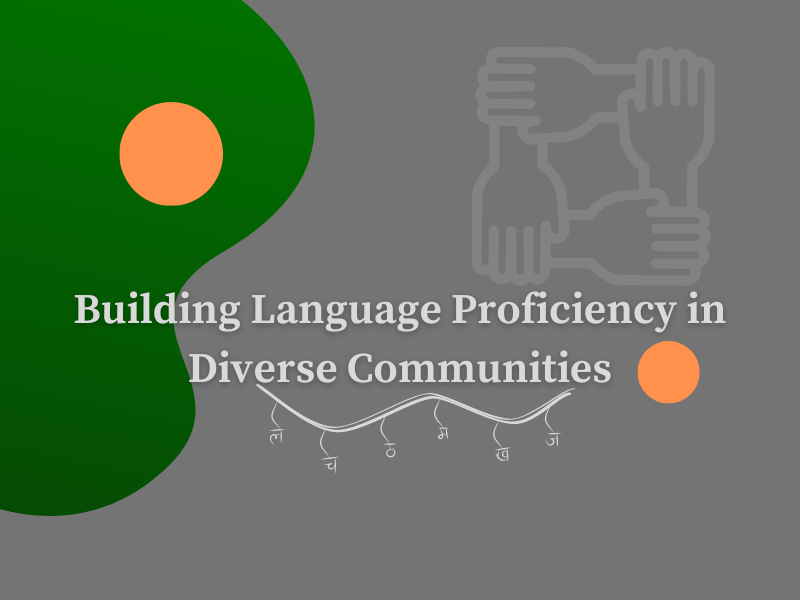Building language proficiency among various communities in India is not a simple task. Language serves as the backbone of culture, identity, and communication. India, with its diverse cultural tapestry, boasts an impressive array of languages, making it a linguistic treasure trove. However, this linguistic richness also presents unique challenges, particularly in ensuring basic literacy for all citizens, especially those in marginalized minority communities. In this article, we delve into the importance of teaching basic literacy to all people in India and the significance of empowering marginalized minority communities through language proficiency. We explore the transformative impact of language empowerment and how it opens pathways to education, employment, and social integration. Emphasizing a progressive tone, we uncover the collaborative efforts and innovative approaches needed to build language proficiency in diverse communities.
Importance of Teaching Basic Literacy in India
Language Proficiency: A Key to Inclusivity
Language proficiency is a vital aspect of building an inclusive society in India. Basic literacy skills enable individuals to communicate, access information, and actively participate in various social, economic, and political spheres. By empowering people with language skills, we bridge the gaps that hinder social integration and ensure that all citizens have the tools they need to contribute meaningfully to their communities and the nation as a whole. In this article, we explore the importance of teaching basic literacy to all people in India, with a particular focus on marginalized minority communities. We delve into the transformative impact of language empowerment, preserving cultural heritage, and breaking the cycle of poverty. By prioritizing language proficiency, we can create a more cohesive and empowered India, where everyone has the opportunity to thrive and succeed.
Empowerment through Mother Tongue Literacy
Empowering marginalized minority communities through mother tongue literacy is a crucial step towards preserving their cultural identity and fostering a sense of pride and belonging. Mother tongue serves as a vessel for transmitting cultural values, customs, and heritage from one generation to the next. By promoting basic literacy in their native language, we enable these communities to not only preserve their rich cultural heritage but also to actively participate in the modern world while staying rooted in their traditions. Mother tongue literacy empowers individuals to express themselves, engage with information, and communicate effectively, thereby breaking down barriers of exclusion and allowing them to embrace their unique cultural identities with confidence and dignity. This article explores the transformative impact of mother tongue literacy in empowering marginalized communities, highlighting its role in nurturing a sense of identity and agency in the face of globalization.
The Transformative Power of Language Proficiency
Breaking the Cycle of Poverty
Breaking the cycle of poverty begins with providing basic literacy to marginalized communities. Education is a transformative force that can uplift individuals from impoverished conditions by offering them the knowledge and skills needed to secure better job opportunities and achieve economic stability. Language proficiency is a key aspect of this process, as it empowers individuals to access educational resources, engage in learning, and participate actively in society. By promoting basic literacy, we equip marginalized communities with the tools they need to break free from the constraints of poverty and create a pathway to a brighter and more prosperous future.
Preserving Cultural Heritage
Preserving cultural heritage is intricately linked to language proficiency. When we nurture language skills in diverse communities, we create a pathway to safeguarding their unique traditions, customs, and ancestral wisdom. Language serves as a vessel for transmitting cultural knowledge, oral narratives, and historical experiences from one generation to the next. By promoting language proficiency, we empower communities to uphold their rich cultural heritage and maintain their distinct identity amidst the currents of modernity and globalization. As we preserve diverse languages, we contribute to the vibrant tapestry of Indian heritage, celebrating the richness and diversity that defines our nation’s cultural legacy.
Innovative Approaches to Language Empowerment
Community-Driven Initiatives
Community-driven initiatives play a pivotal role in empowering marginalized communities and promoting language proficiency. Led by local leaders and stakeholders who intimately understand the needs and challenges of their communities, these initiatives foster a sense of ownership and commitment to the cause. Language camps, workshops, and cultural events become powerful platforms for engaging learners and revitalizing their mother tongue. Through these grassroots efforts, communities actively participate in preserving their cultural narratives, passing down traditional knowledge, and nurturing language skills among the new generation. By empowering communities from within, we create a sustainable and inclusive approach to language development that uplifts marginalized groups and strengthens the fabric of our diverse society.
Technological Advancements
Technological advancements have revolutionized language learning, making it more accessible and engaging than ever before. With the integration of innovative technologies, such as interactive e-learning platforms, mobile apps, and multimedia resources, learners can embark on their language proficiency journey at their own pace and in their preferred learning style. These digital tools offer a wealth of interactive content, quizzes, and games that create an immersive and enjoyable learning experience. Moreover, technology breaks geographical barriers, reaching learners even in remote areas, thereby democratizing access to education and empowering individuals from diverse communities to enhance their language skills and cultural understanding. Embracing technology in language learning opens new horizons for learners, facilitating a global exchange of knowledge and fostering a more connected and inclusive world.
Mentorship and Oral Tradition
Mentorship Programs
Mentorship programs play a vital role in nurturing language proficiency and cultural preservation within marginalized communities. By connecting proficient language speakers, often tribal elders, with younger generations, these initiatives facilitate the intergenerational transfer of ancestral knowledge and cultural narratives. Through one-on-one guidance and storytelling sessions, experienced mentors impart the wisdom embedded in their native language, ensuring that traditional customs and oral traditions continue to flourish. The bond between mentors and mentees fosters a sense of pride and belonging, instilling a deeper appreciation for cultural heritage and language. Mentorship programs stand as a testament to the power of human connection in language revitalization, as the torchbearers of linguistic wisdom empower the new generation with the tools to preserve their identity and build a brighter future.
Preserving Oral Traditions
Preserving oral traditions is a vital aspect of safeguarding India’s cultural heritage. While written literacy remains crucial, oral storytelling and cultural performances hold equal significance in celebrating the nation’s diverse cultural tapestry. By incorporating these traditional practices into language programs, we ensure that the wisdom, customs, and historical experiences of various communities are passed down through generations. Through captivating narratives and engaging performances, oral traditions become living testimonies of India’s rich history and values. Embracing oral traditions alongside written literacy not only fosters language proficiency but also deepens the sense of cultural pride and identity among learners. As we cherish the power of spoken words and vibrant performances, we preserve the heart of India’s cultural heritage for posterity, bridging the gap between the past and the future.
Conclusion
Building language proficiency in diverse communities is a transformative endeavour that empowers India’s marginalized minority. Basic literacy serves as the cornerstone of personal growth and community development, opening doors to countless opportunities for advancement. By nurturing language skills, we foster inclusivity and celebrate the vibrant linguistic diversity of our nation. As we move forward with a progressive vision, let us continue to invest in language empowerment, creating a society where every voice is heard, and every individual thrives. In doing so, we build a stronger, more cohesive India that embraces its rich cultural heritage and paves the way for a brighter future.

